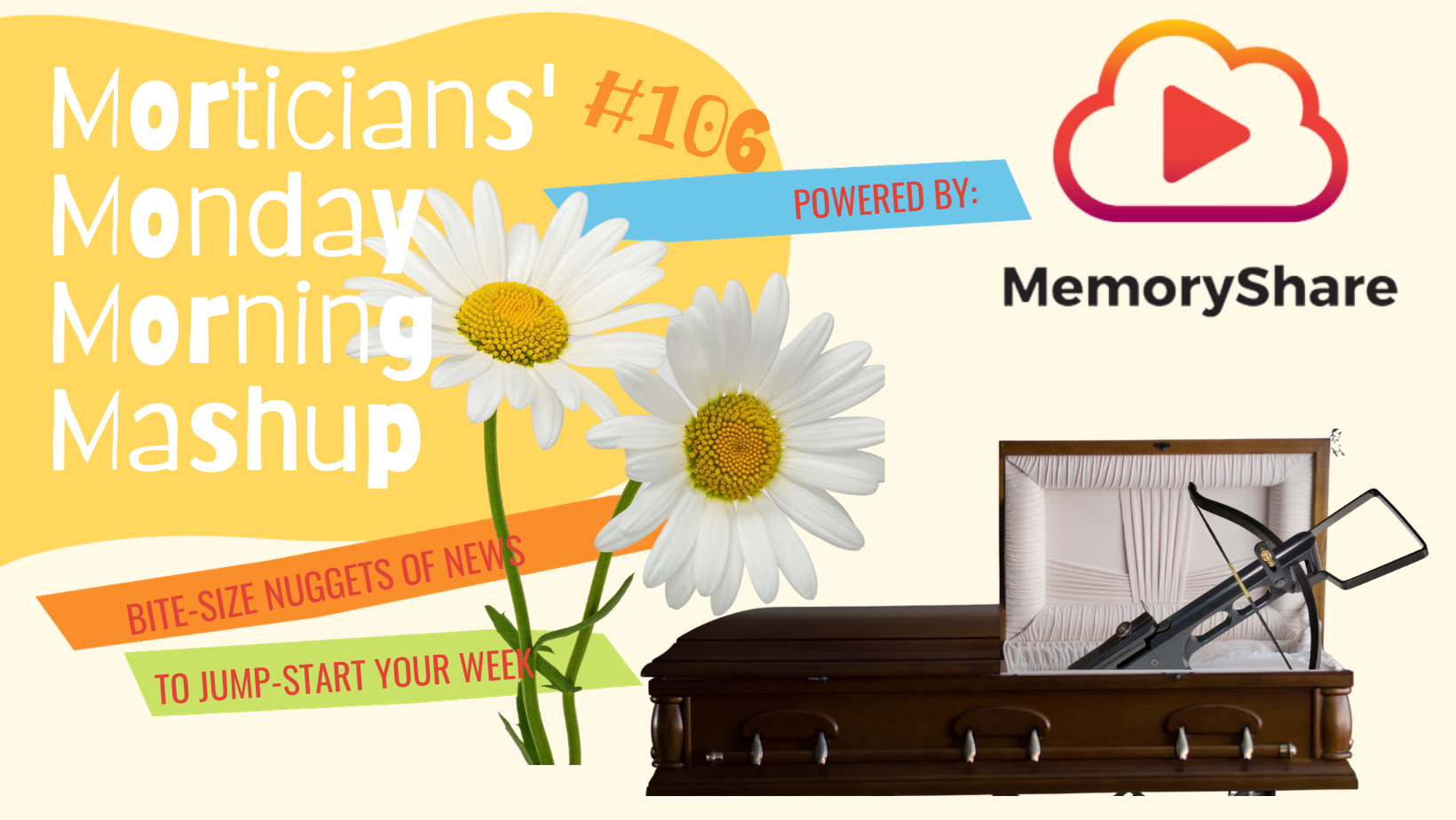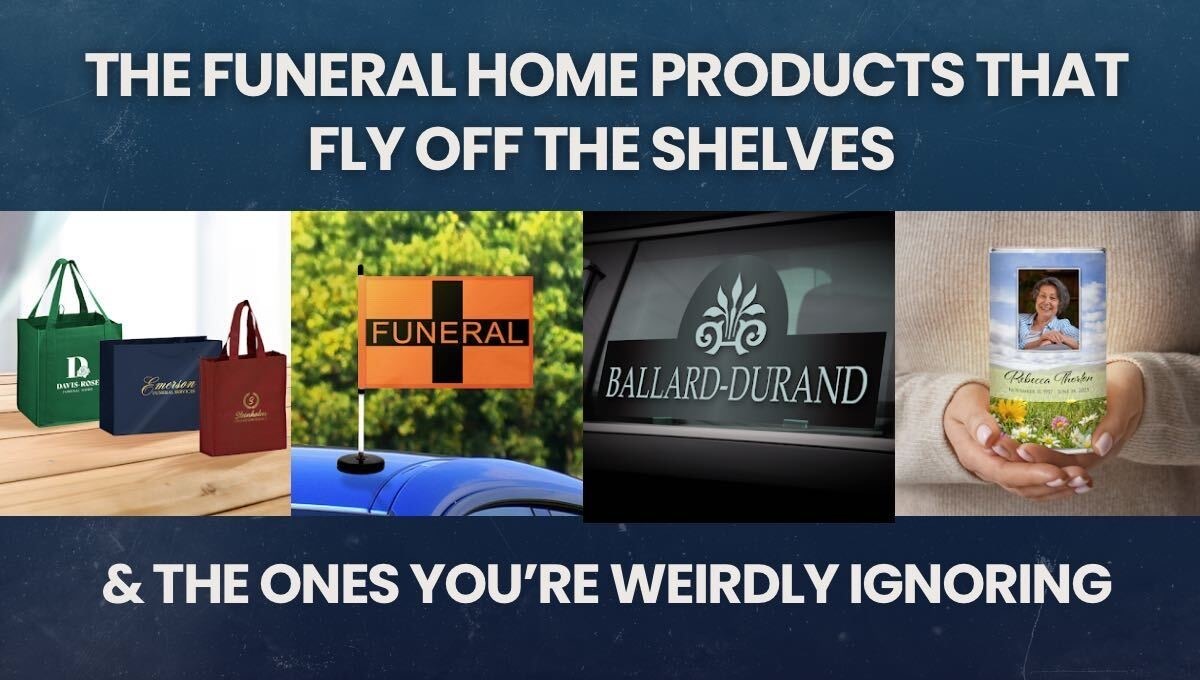Casket Crossbows & Daisy-Fresh Corpses | 4M #106
Welcome to the hundred-and-sixth edition of Morticians’ Monday Morning Mashup, 4M #106, where we’ll serve up bite-sized, easily-digestible nuggets of the deathcare news you need to crush conversations in the week ahead. Bon appetit!
This newsletter is powered by MemoryShare, a funeral livestreaming platform that you can set up in 30 seconds or less.
Food for thought … and body preservation
Just in case you were worried that Americans’ love of junk food might one day eliminate the need for embalming, you may now relax. Snopes, the Internet’s “definitive fact-checking site,” has thankfully debunked the idea that “Junk-food keeps American corpses fresh as daisies!” This was the title of a 1991 tabloid story alleging that the preservatives in junk food would make corpses “become waxen” instead of decomposing. The article said this was cause for concern in places like Germany, where graves are routinely cleared of their decomposed inhabitants to be reused for new burials.
Ask for permission rather than forgiveness
A Florida man recently contacted his local news station to share his outrage at a funeral home’s initiative to preserve his deceased mother’s fingerprints. According to the report, he’s not only upset that her prints were taken without his permission, but that a keepsake jewelry company has contacted him about purchasing items featuring the print. He is concerned about what “nefarious act” this “third party” could do with “this information” (her fingerprint), but admits, “I don’t know.” The station confirmed that this practice is not illegal, although authorities, including the NFDA, recommend getting the family’s permission to take the prints. The funeral home in question has since implemented this policy.
Your own private Idaho landfill
For whatever reason, an Idaho radio station has published a list of 19 things the state will allow cemeteries to deposit into a grave with the deceased, and they’re, well, quite bizarre. The station allegedly got this list from an Idaho funeral home, so we’re not quite sure if these are things that have actually been buried, or if it’s just a strange collection of “what-ifs” — we’ll let you be the judge. Sounds to us like a cemetery stuffed with these items may become more like a weird landfill than a sacred place to honor loved ones. So, while batteries and pets are not allowed, the following are supposedly welcome:
- Projector screens and satellites
- Traeger smokers and hot sauce
- Porcelain doll collections
- Tools and beauty salon equipment
- Foosball tables and a Nintendo gaming system
- Typewriters and art
- Crossbows, firearms, and flamethrowers
- Car engines and DJ turntables
- Cleaning products and kitchen appliances
A new kind of disclosure
It’s true that real estate agents and/or homeowners in most states are required to disclose to potential buyers that a violent crime or a death related to the property has occurred in a home. There’s probably not a similar requirement pertaining to hauntings, though. Even so, a Massachusetts broker isn’t taking any chances with an 1850 property that for 80 years served as a funeral home. She’s topped her agency’s For Sale sign in the yard of the $769,000 historic home with a “Probably Haunted” placard. We’d love to know if this is a creative marketing tactic or if there’s some evidence to support the claim. Either way, it’s definitely setting this listing apart.
(Alleged) Crime and (potential) Punishment
It’s been a busy week on the not-so-sunny side of Deathcare Street:
- A Kentucky coroner is being sued for allegedly leaving a man’s brother “in a hot car to decompose overnight.”
- A Tennessee mortuary owner has been charged with theft for allegedly charging $15,000 on the credit card of a deceased man he was paid to transport to his funeral home; he allegedly used the card to purchase a sign for his funeral home.
- An Oklahoma woman has filed a formal complaint with the state’s deathcare board alleging that a funeral home has held the cremains of her father since 2020 for nonpayment, which, technically, is not illegal.
- A UK woman is accused of stealing embalming equipment from a funeral home (and we have more questions than this article answers, as in, “What did she plan to do with it?”).
- An Ohio man is suing a cemetery for providing four different potential locations for his father’s unidentified grave over the past seven years, and another family is considering doing the same.
- A city in the UK is considering charging funeral directors £100 to £200 ($122 to $244) per day for being tardy in picking up a body from the regional morgue after a three-day grace period, alleging that directors are taking advantage of “free storage.”
Say goodbye to Facebook
If you’re using Facebook for live streaming, does this sound familiar?
- Copyrighted music is silenced (even with proper certifications!)
- Advertisements out of your control pop up during the livestream
- It’s difficult for families to access because it requires a Facebook account
This is why Carlton Stevens Jr., Operations Manager and Mortician at Stevens Funeral Home in North Carolina, said goodbye to Facebook and switched to MemoryShare—a live streaming platform built specifically for funeral professionals.
“Now, families don’t have to worry about Facebook accounts. It works, and it’s easy to use,” Carlton said. “It’s the best, I’m telling you. It’s liquid gold.”
After he started offering live streaming during the pandemic, Carlton saw Stevens Funeral Home call volume bump from 20 calls to 41 calls.
Today, Stevens Funeral Home live streams a service every other day.
And with MemoryShare, all they have to do is push a button.
“It’s a no brainer,” Carlton said.
Read how Carlton is using livestreaming to grow his business in our latest case study—click here to read it!




